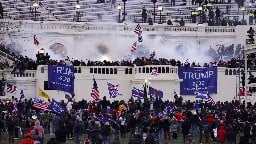Can Trump be on the ballot in 2024? It can hinge on the meaning of 'insurrection'



Liberal groups have filed lawsuits in Colorado, Minnesota and other states to bar Trump from the ballot, citing a rarely used constitutional prohibition against holding office for those who swore an oath to uphold the Constitution but then “engaged in insurrection” against it. The two-sentence clause in the 14th Amendment has been used only a handful of times since the years after the Civil War.
Because of that, there’s almost no case law defining its terms, including what would constitute an “insurrection.” While people have argued about whether to call Jan. 6 an insurrection ever since the days following the attack, the debate in court this week has been different — whether those who ratified the amendment in 1868 would call it one.
“There’s this very public fight, in all these colloquial terms, about whether it’s an insurrection, but it really comes down to brass tacks defining what this constitutional term means,” said Derek Muller, a Notre Dame law professor who’s followed the litigation closely.
NAL but here's my own small dive into the "what does insurrection mean" argument ...
The 12th Amendment clearly states how the President is chosen, and Section 3 of the 14th Amendment states that no one may hold office if they "engaged in insurrection or rebellion against" the Constitution.
It's the "or" between insurrection and rebellion that's important here as it means the definition of insurrection is not vital to charges being laid ... the word "rebellion" is easier to define and Jan. 6 was exactly that -- a rebellion against the completion of the 12th Amendment where the legally chosen President would be sworn into office.